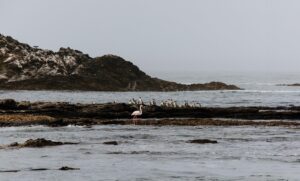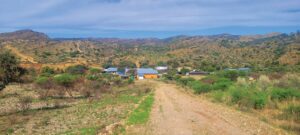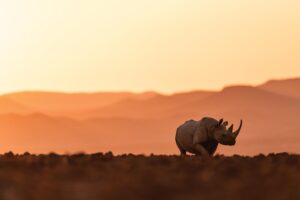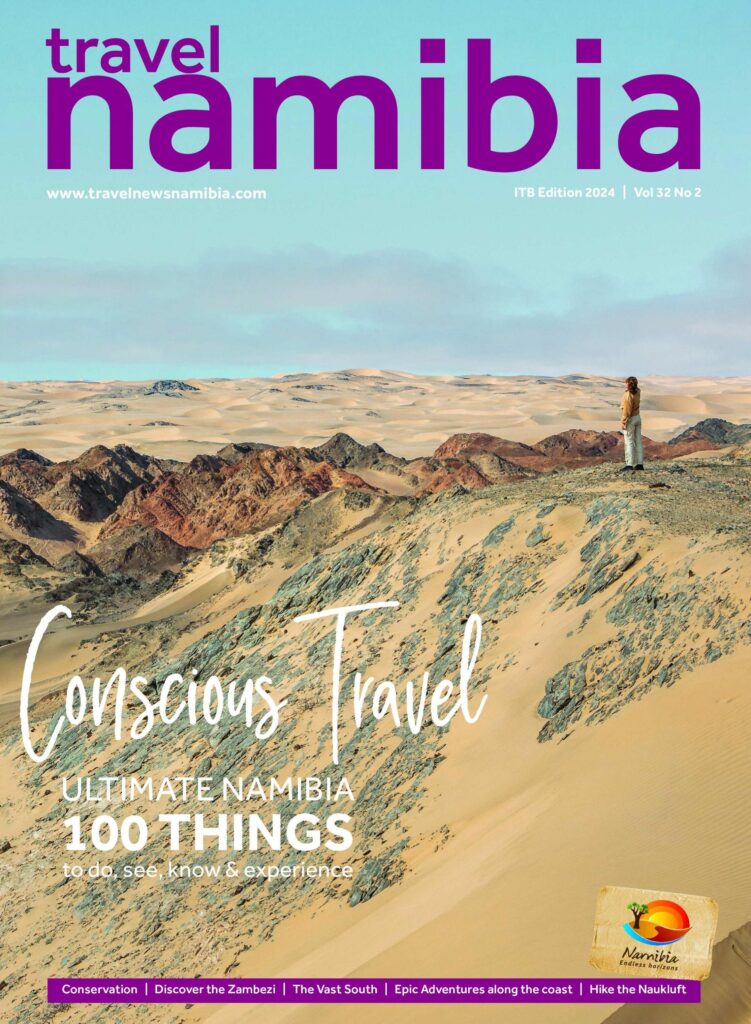
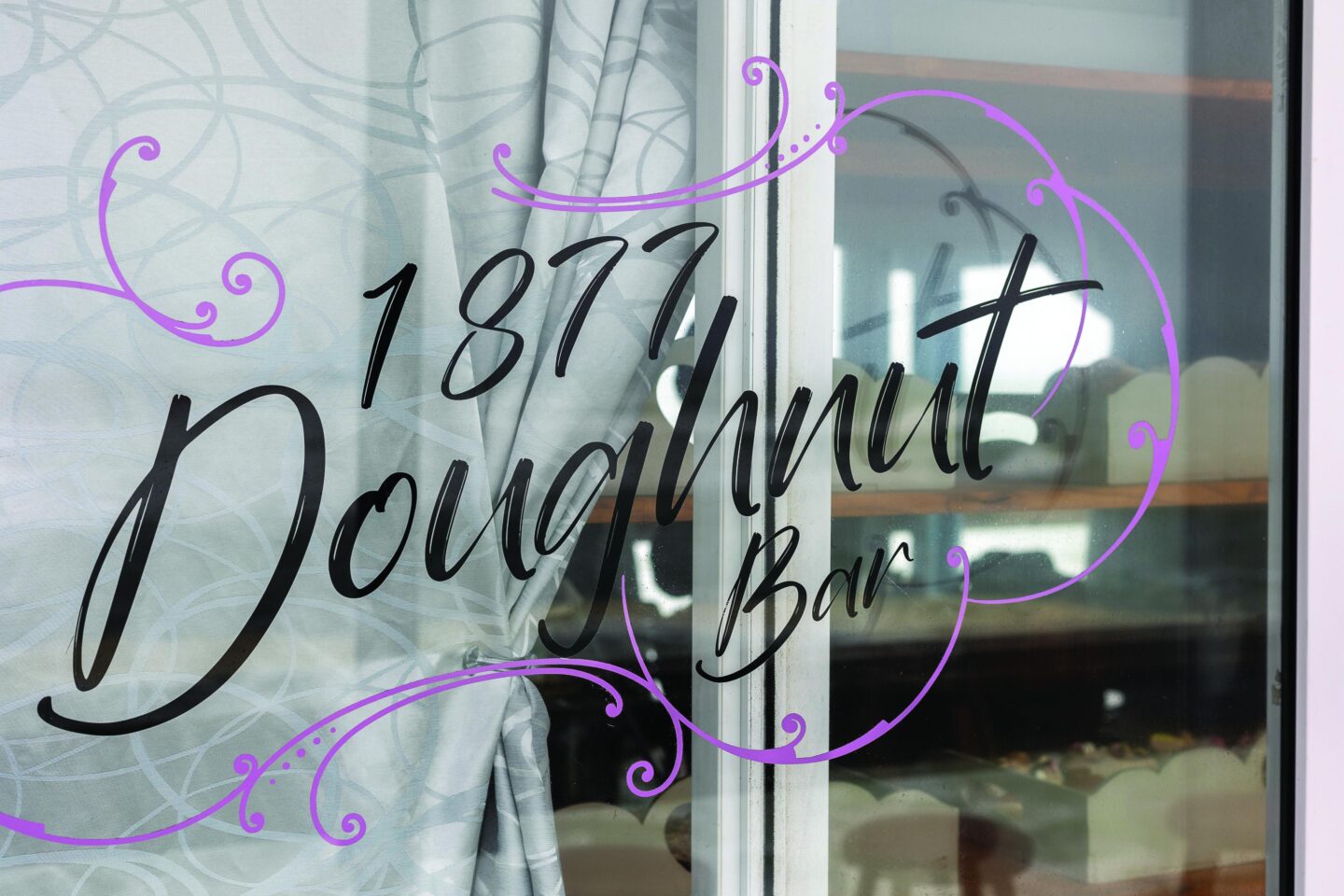
Making Mindful Moves
along coastal shores
Text Kirsty Watermeyer | Photographs Kirsty Watermeyer
From the ITB 2024 issue
The benefits of travelling have been proven many times. It improves brain function, boosts mental health and it has been linked to stress reduction. However, when travelling, we often adopt unhealthy habits. Our diets change, as do our sleeping habits. This can have an effect on our health and wellbeing.
Conscious travel extends past our impact on the environment and includes the impact travel has on our bodies. Making mindful travel choices helps us to slow down and appreciate the finer details of what is going on around us. This can have a positive effect on our carbon footprint and the environment, whilst supporting local markets and people.
We have created a list of a few of the mindful, conscious or environmentally friendly places you can visit on your trip to the coastal town of Swakopmund.
SEASONAL EATING WITH FARMGANIC
Eating organic increases the amount of vitamins, minerals, enzymes and micronutrients in your diet. There are no artificial flavours or preservatives, and cleaner food means cleaner diets, which leads to a cleaner bill of health. What is more, organic farming creates healthy soil. Healthy soil creates healthy food and a healthy environment.
In Swakopmund there are more than one option to source your organic produce. One of these outlets, Farmganic, sources organic and local items from all over the country for you to enjoy a taste of fresh Namibian produce. They believe in the benefits of supporting locally grown produce and eating seasonally.
According to the owner, Anja Hofmeister, there are no imports in her shop. “Our products are locally grown or made all over Namibia.” Anja sources seasonal and fresh items according to farmers’ specialities and the harvest times of their produce. “For example, around May and June we get the sweetest giant mangos grown in the Uis area, ready to eat. I stock a range called ProBio from a farmer in Otavi who grows everything organically and manufactures everything on the farm. She has fields of hibiscus and she’ll make hibiscus tea or jam. Whatever she has on her farm, she utilises.”
“I also stock game. If people are going on a camping trip and want to get an Eland steak for their trip, they come here. You find things here that you won’t get in Germany, like prickly pear jam or hibiscus jam. We also have a growing demand for local honey. The beekeepers around Namibia are a small group, and I source from them. They have hives in places like Otjiwarongo, Otavi or Omaruru.”
Anja explains that understanding this seasonal way of life is essential to become a more conscious traveller. “We need to get back to basics and live closer to the Earth’s natural cycles. For example, at Easter time free-range chickens don’t lay eggs. That’s their time for moulting. They lose their feathers and don’t have enough hormones to produce feathers and eggs. We need to be understanding of nature’s cycles. In the past you would only find oranges during their season. We’ve forgotten that and this is how we can live closer to the Earth. We need to eat seasonally and live seasonally. We do that with the way we clothe ourselves based on the season. Why not also do that in the way we eat and live? It’s better for the environment.”
Find Farmganic and their variety of organic and local farm produce, jams, bakery products and snacks at 15 Swakop Street, Swakopmund.
HEALTHIER TREATS WITH THE 1877 DOUGHNUT BAR
Doughnuts date back to Germany in 1485. It is here that the recipe for stuffed fried dough cakes without sugar was found in a German cookbook published in Nuremberg. It was a revolutionary recipe – jam placed inside deep-fried yeast bread dough. It is unclear whether the anonymous author actually invented the idea, but the concept of filling a doughnut with jam quickly spread across the globe.
A sourdough doughnut is one made from sourdough yeast. It makes for a more flavourful doughnut that is soft and springy. What’s more, because it has been fermented, it facilitates the absorption of iron and magnesium in the body, and is high in minerals such as zinc and calcium.
With its home on the historic jetty in Swakopmund, the 1877 Doughnut Bar opened in 2021. “The 1877 comes from the sourdough that we use. The original plant came from Germany in 1877 and has been kept alive since then,” explains manager Terence (Terry) West.
Terence invents the interesting and ever-changing flavours at the 1877 Doughnut Bar. “It is a small family business. I make it all myself and we use the best quality products. For example, we don’t use margarine, only butter.”
“We use sourdough because it makes a great tasting doughnut, but also it’s fermented, so it’s easier on the digestive system.” Terry is happy to add that you’d need to eat three of his doughnuts to consume as much sugar as you’ll find in popular fizzy drinks.
When asked why he and his family decided to open a doughnut bar, Terry animatedly tells the following story: “I had been studying in Germany and I used to buy my jam Berliners every day at a place next to where I was studying. It was my little treat, but the place closed down. I came back to Namibia and researched what goes into a great Berliner. My mom was talking about what we should all do, and I made a joke about starting a doughnut shop. That’s how it all came about.”
Find the 1877 Doughnut Bar on the Swakopmund Jetty.
LOOK AFTER YOURSELF AND THE ENVIRONMENT WITH HEAL HEALTH WAREHOUSE
Heal Health Warehouse has established itself as a Namibian hub for natural and eco-friendly products, including ranges that focus on health, beauty, food, home and baby products. Based in Swakopmund, this local business has grown a strong online shopping presence that allows you to shop their range from anywhere in the country through their countrywide shipping.
Shereez Martin, manager at Heal Health Warehouse, explains that they are “a one- stop health shop” that was established five years ago. “Our goal is to be the one place where you can get everything and where you can ask questions. We do a lot of research, so when people ask questions, we can give the best advice.”
She goes on to explain that they have put great attention towards creating an easy online shopping experience so that customers can conveniently order from anywhere in Namibia. In fact, she is generally the person packing the orders and is more than happy to answer questions or assist in any way. Her personal experience with the natural route has made her a passionate advocate for natural solutions. “Personally I have seen the power of the natural path. My body does better when I look after it in this way.”
Shereez recommends taking mindful journeys, explaining that this can mean taking and using biodegradable or earth-friendly products on a camping trip without harming the environment or leaving anything behind. That is the real beauty of the 100% natural products which you can find at Heal Health Warehouse.
Shereez also recommends parking your car and walking as a way to travel more consciously. “In Swakopmund, we have the perfect environment for walking. Do more things that are healthy when you’re travelling and take the road less travelled.”
Heal Health Warehouse stocks all kinds of health products, from healthy car snacks to organic and natural supplements and more. “We can always help or give tips on whatever you need for the journey,” says Shereez.
She concludes by sharing a personal story of being more mindful: “I was recently camping at Brandberg and along the way I would fill up my empty water bottles and give water to people along the road who don’t have access to water. I reused the bottles that I took and passed along some water. It’s a little thing, but little things do count. To me that is being mindful.”
Find Heal Health Warehouse at 14 Hendrik Witbooi Street, Swakopmund or at www.healhealthwarehouse.com.
TASTE LOCAL FARM PRODUCTS AT THE SWAKOP RIVER MARKET
The Swakop River starts its journey to the Atlantic Ocean in the Khomas Hochland. Flowing westwards, it crosses the Namib Desert before reaching the ocean at Swakopmund. Despite its irregular flow, delicious fresh produce such as tomatoes, asparagus and olives are grown alongside the riverbank just before it meets the town of Swakopmund. Growing in what is a desert environment, these vegetables are organic and very popular across Namibia.
As a way for local and international tourists to experience the bounty of the Swakop River, a well-known resident of the Swakop River Plots, Wolfgang Gellert, has started a market hosted every weekend at his new restaurant, Gellert’s Stube.
Wolfgang is a master butcher who studied his trade in the late 1970s in Germany. He has lived and worked in Swakopmund for many years, and his most recent endeavour is the retirement project that he runs alongside his butchery at the plots, 14 km outside of Swakopmund. “I grew up on the farm, around nature and working with meat. I have owned butcheries in Swakopmund and worked for other companies in the food trade. I have retired since and the work I do now is a passion. My products are organic. I mix all the spices myself and dry my own herbs.”
Wolfgang, together with his partner Stephanie Gellert, launched the weekly Swakop River Market as a platform for local producers from the Swakop River to sell their goods. “We invite vendors who grow and make things at the plots. Whatever they produce, we sell at the market. It’s things like eggs, olive oil, tomatoes, plants and farm-fresh veggies. It’s foodstuff all locally grown and made,” says Wolfgang.
“We started small, and it’s not commercial. It is fun and family focused. When you come to us you get to enjoy a taste of Namibian food. Good food. Back to nature and the earth. People who grow things at the Swakop River don’t do it for money because you don’t make much money. They do it out of passion. I hope that this market will help support people making local products. The money we make is ploughed back into the market to grow the market and make sure it is well attended,” explains Wolfgang.
Find out more about the Swakop River Market through the Gellerts Delikatessen & Catering Facebook page or at the Farmganic shop. TNN
More to explore

Discover Airlines launches a new direct flight between Windhoek and Munich
